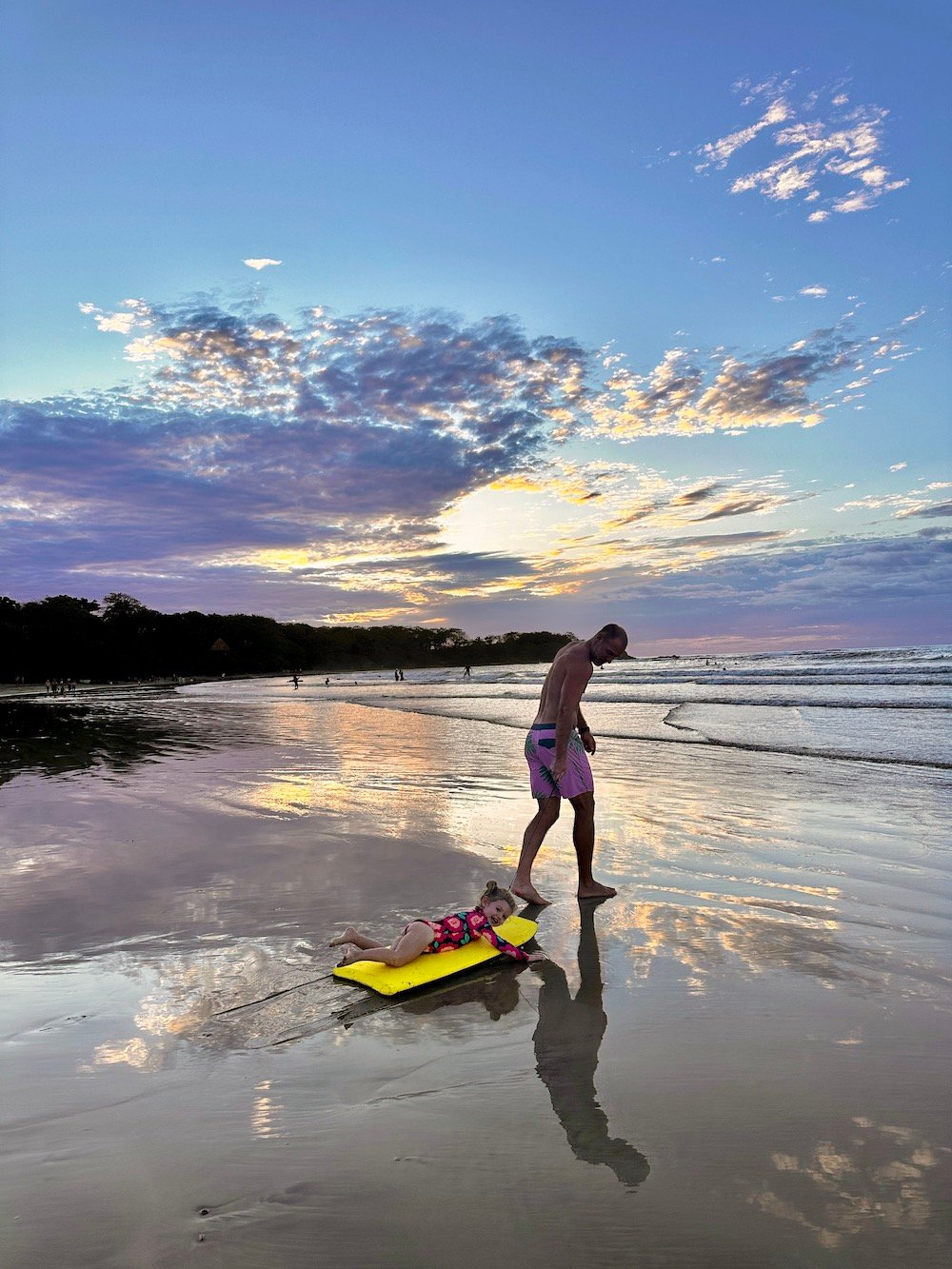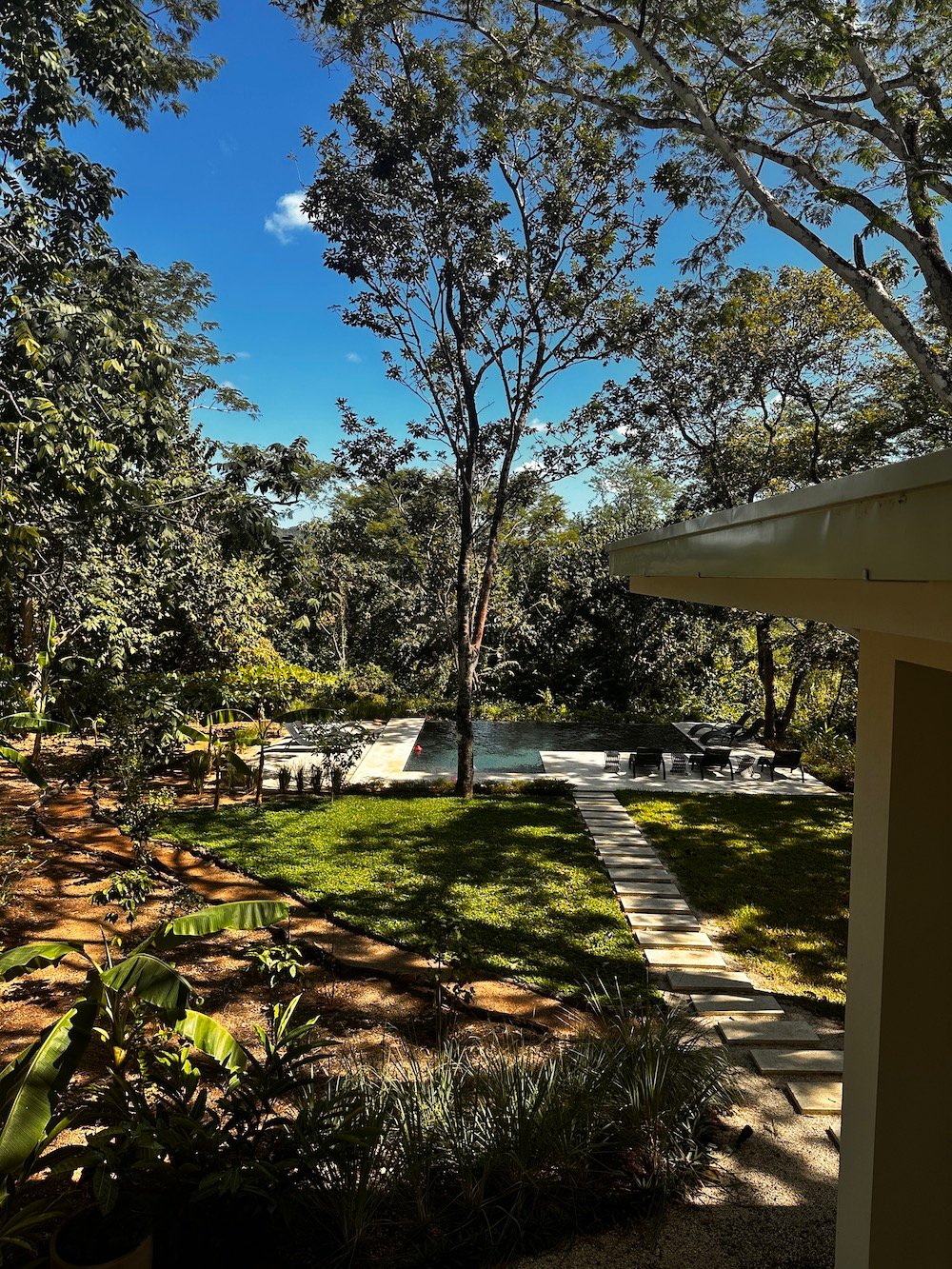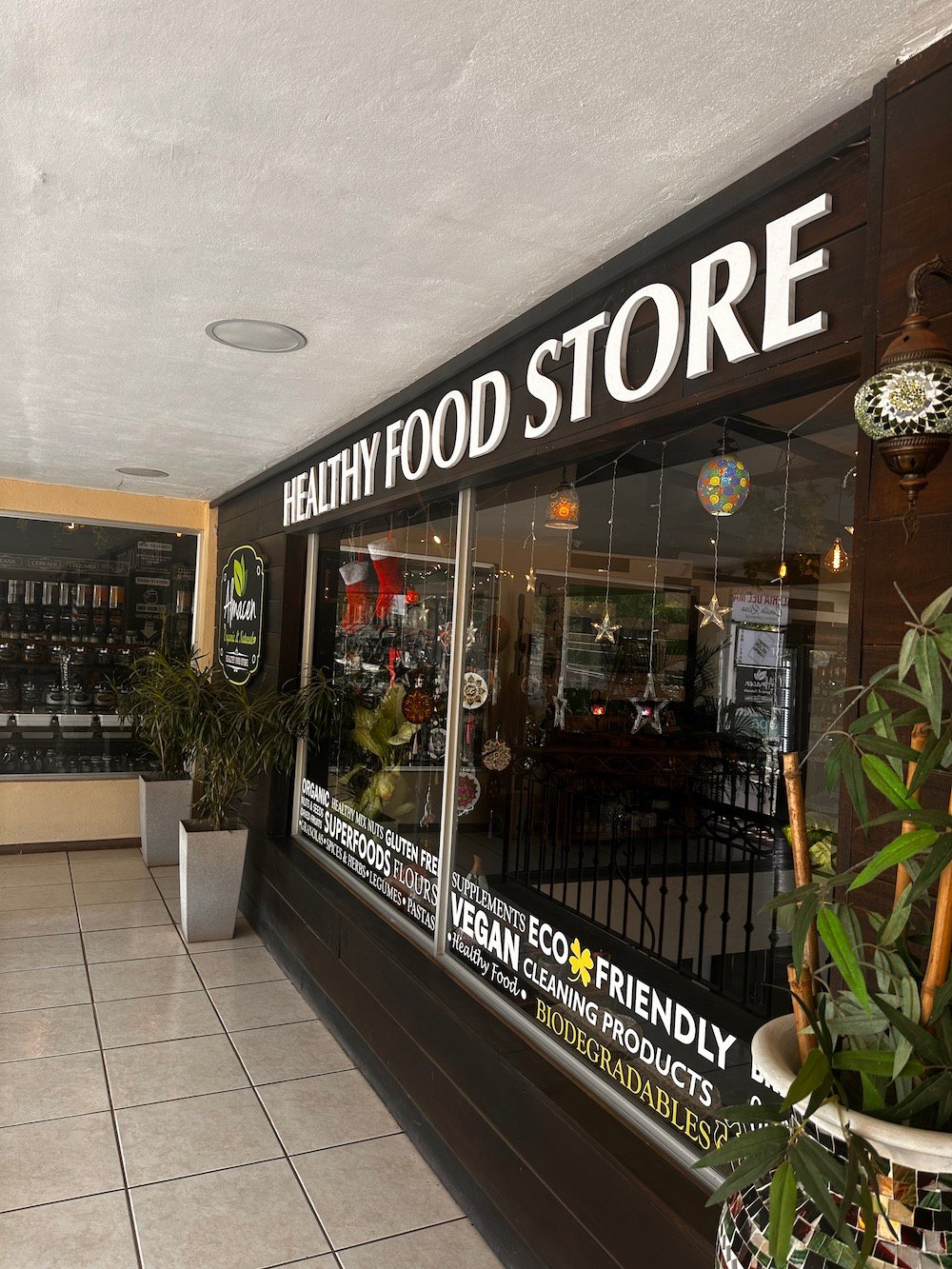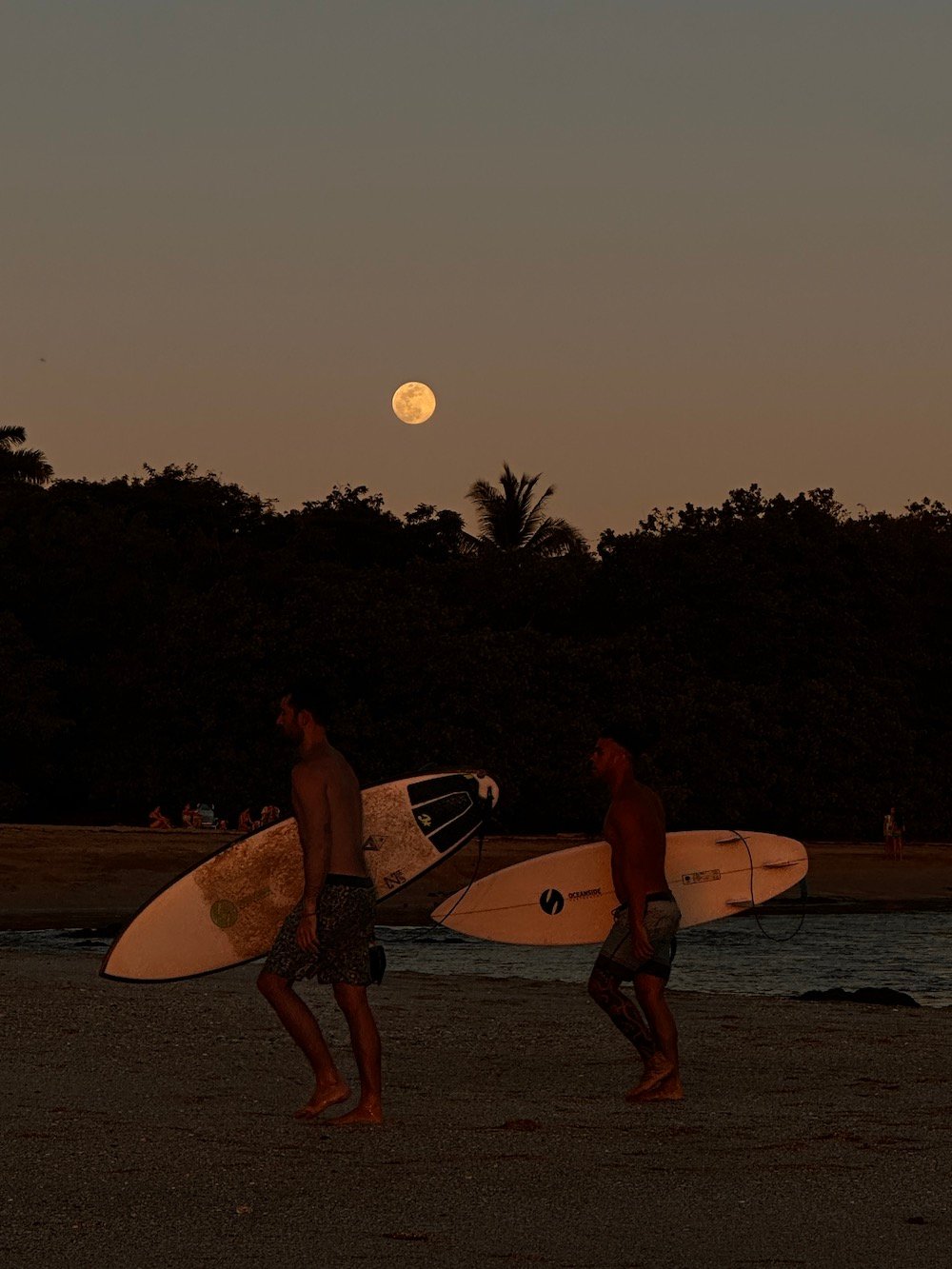This is not financial advice nor legal advice. Please advice with professionals when making a huge life choice.
Let me preface one thing before I get into all the details (other than making sure you don’t listen to a random chick on the internet about financial choices) – we haven’t officially moved full-time to Costa Rica and we don’t know if we ever will. But we did buy a house here and are currently splitting our time between Costa Rica and Colorado. Since our daughter is still young, we have the flexibility to bounce back and forth before we have to settle down more in one spot for her to go to school. The whole reason we ended up buying a home in Costa Rica is because we see ourselves living here more than Colorado and having our daughter go to school here so she can be raised bilingual and in a different culture than we grew up in. We also wanted to be near the ocean, but didn’t want to live in California or any of the other coastal cities in the US. So after traveling to Costa Rica multiple times, my husband and I both decided we wanted to call Costa Rica home. So that’s what we did. Now let’s get into the nitty gritty.


How We Chose The Area To Live
Choosing an area was super simple for us and we really didn’t do a ton of research. In human design (google it if you’ve never heard of it), the way I make decisions is emotional – it’s based on how something makes me feel. And whenever we were in Tamarindo on vacation, my soul literally felt tethered to the sand. There’s no better way to explain it other than my body TOLD ME to be here. And I listened. Tamarindo is only about an hour or so away from the Liberia airport, which is also a direct flight from Denver. Tamarindo is also on the beach and it’s a very touristy area so it has easy access to restaurants, grocery stores, and other daily needs, which is helpful.
What It’s Like To Buy a House in Costa Rica
When we decided we wanted to buy a house in Costa Rica, we began doing google searches for houses available in Tamarindo and came across different listings along with the real estate agents tied to those listings. We would reach out through those sites and often times received no response. But we did find a few real estate agents who responded and sent them houses we found while they found more houses for us to check out. We then booked a trip to Tamarindo where we toured 16 different homes in the area in 2 days. On the second day, we found our current house and instantly knew it was the one. There was no question about it.
Now choosing how to purchase your home is the more complicated piece. We looked into financing our Costa Rica home and found out that getting a mortgage that is outside of your own country is challenging because of down payment rates and fees. Even finding a bank willing to do that is complicated. Once we did find a bank, they wanted 40% down with 12% interest, plus another $20k in fees. The interest also wasn’t fixed so it could change at any point. We didn’t budget for those kinds of fees so it just didn’t make sense. We ended up speaking with our financial advisor and figured out a way to pay cash, pulling money from one of our investment accounts, while not disrupting our longterm retirement goals. We also went over budget with this home, justifying it by knowing we would use it as a short-term rental when we weren’t living there.
Once we decided how we wanted to purchase the home, an attorney was recommended by our real estate agent. We signed a power of attorney (POA) on having them sign on our behalf since we couldn’t be there in person AND because the documents are all in Spanish. But Brian still translated all the documents and read them before we signed. We ended up signing while still in Colorado. We found that there were far less documents to sign than what we sign in the US, but there is still proper due diligence and inspection.


Learning More About Short-Term Rentals
Since we don’t plan to live full-time in Costa Rica quite yet, we wanted to offset costs by renting it out when we are gone. And before we purchased our home, the house was already being used as a short-term rental and had dates already rented out. We did research on short-term rentals in the area, possible income for different sizes of homes, and then asked for an analysis from the property management company that was already managing this house. When deciding on a property management company, it’s important to interview each company and ask for an analysis on the property that you are interested in. I think it’s also important to have a good rapport with the company and easy communication to really know if it’s the right management company for you. We have loved our property management company because we always know what is going on at the house, we can ask for updates while out of town, and we can change anything for our guests as needed. It’s been a really great experience so far!
Buying a Car in Costa Rica
Once we bought our home, we knew we would need a car, but we didn’t have a space to leave it while we were gone. So my husband began researching companies that store your car while you are gone. He found a spot that not only stores it, but they also run it once a week, wash it before you need it, and drop it off at the airport for you to pick up when you land. So far, it’s been a really easy experience with them.
But buying a car was definitely more challenging. It was very hard to first get over the sticker-shock with the price of cars in Costa Rica. So we thought about importing a car OR driving one down ourselves, but that process involves paying 50% import tax on the value of the car so we scratched that. Instead, we found a car broker in San Jose that we talked to over WhatsApp for weeks, telling him exactly what we were looking for and needed. He was willing to drive the car from San Jose to Tamarindo to drop the car off with Brian when he flew into town for a quick trip. We used the same attorney for our house to help us through the buying process for the vehicle. Brian put the money for the purchase of the car in escrow and he signed the documents when he got into town, to ensure everything was legitimate. This was an added expense but it prevented us from being scammed.
Finding a School in Costa Rica
This is a paragraph I’ll have to add to as we get closer to choosing a school. When we first thought about moving to Costa Rica, we began asking people we met in town about the schools. And we found out that there were many to choose from, whether we wanted to go private or public. Our goal is for Avery to be bilingual so we want her to be immersed in a school that speaks Spanish, which will be a big factor in our decision with where she goes. Since she doesn’t need to go for a couple more years, our plan is to start touring all the schools nearby to see which one will be the right fit for her. I also know that people will homeschool, especially when wanting to live in different places, but I just don’t think I could do a good enough job as Avery’s teacher so I don’t think we will take that on. But I also said I’d never have kids so never say never!
Citizenship vs Non-Citizenship
Since both my husband and I work for ourselves, we don’t need a work visa while living in Costa Rica, which is a factor for some people when moving here. When it comes to living here, at this point you can stay in Costa Rica for 180 days (it used to be 90 days and is still subject to change) before you need to leave the country. Many people we have talked to will do weekend trips to Nicaragua when they hit that 180 day mark before heading back to Costa Rica after. This is what we plan to do at this point if we are staying more than 180 days. There are pros and cons with becoming a citizen and it does take some time to acquire residency as a non-Spanish or Spanish-American person. One of the pros includes better access to affordable healthcare while a con is paying taxes in Costa Rica as well as the US. So for us, at this point in time, we plan to either go back to Denver or cross the border at 180 days. This is definitely an important factor to think through when deciding to purchase a home in another country.
Cost of Living
One of the questions I’ve seen the most is how the cost of living compares to the US. I think this all depends on the area that you choose to live (in the US or abroad), but for us, since we live in a pretty touristy place in Costa Rica, I would say the cost is pretty comparable, maybe a bit higher than back in Denver. But this also depends on what types of things you are buying and where, and that can take some time getting used to. As an example, when we grocery shop in Costa Rica, there are multiple supermarkets near us and all of them range in price. At one of them, a pound of grassfed ground beef costs $12 while I can find in Colorado for $10. But I was also able to find a farmer at the farmer’s market who had really great prices on pasture raised chicken that was much cheaper than back in Colorado. As long as we aren’t trying to get super fancy things, like baking mixes we like back at home, I think the prices are pretty comparable at the end of the day and we will quickly get better at purchasing at certain things at certain places to save us some money.
Wherever you plan to live, there will most likely be local farmers, local grocery stores, and maybe even large grocery stores that help you save some money. The best thing to do in any new place that you live is eat local and eat seasonal. The higher processed foods and specific brands will tend to be higher, especially if they need to be imported.


Any Questions?
So far, this is what we have learned and I hope it helps you if this type of life change is something you’ve been thinking of or wanted to explore. We haven’t had enough time here to really know what is in store for us in the future and how much time we will spend here, but I do know that I’ve never felt more like myself than when I’m here. My stress levels are much lower, my activity is higher, my mood is elevated, and I’m spending so much more time in the sun which is always amazing for hormones. This kind of life suits me and my family, and it may do the same for you!
If you have any other questions, please list them below and I’d be happy to answer them (as much as I can) and I would love to add those answers to this post, as well!






